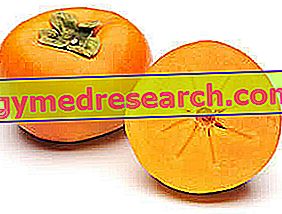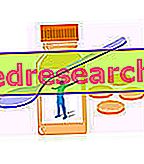Introduction
Soft, fleshy and very sweet, the persimmon fruit symbolizes autumn, a "passing" season, often responsible for exhaustion and psychophysical stress; thanks to the interesting nutritional values and the related properties, the persimmon is an excellent expedient to start the autumn in the best possible way.
First of all, the persimmons are considered very energetic: in this regard they are suitable for children, the elderly and sports lovers. Furthermore, the fruits have laxative, diuretic and hepatoprotective properties.

Nutritional analysis
By studying the tables of the nutritional values of different fruits, the persimmons are certainly not among those with a low calorie content: in fact, 100 grams of persimmons provide about 65-70 kcal (equivalent to about 272 kJ). Water makes up about 80%, sugars as much as 16-18%, while fibers are calculated around 2.5%, proteins at 0.6% and fats at 0.3%.
Among the mineral salts, the primacy (in terms of quantity) is certainly due to potassium (approx. 161-170 mg%), a mineral that gives the persimmon marked diuretic properties. In addition to potassium, phosphorus (20 mg%), magnesium, calcium and sodium are also mentioned; only in traces we find selenium and manganese.
The quantity of vitamin C is also noteworthy: it should be emphasized that the quantity of ascorbic acid varies according to the degree of ripeness of the fruit, ranging from 50 mg to 7 mg in very mature persimmon.
The persimmon is also rich in beta-carotene, precursor of vitamin A: it is estimated that 100 grams of fresh product provide 1.4 mg of retinol equivalent. The pigments (lycopene and xanthines) act synergistically with provitamin A, enhancing its final action (antioxidant and possible prevention of cardiovascular diseases). [taken from Complementary Therapies in Geriatrics, by Enrica Campanini, Stefania Biondo]
The unripe persimmon is a mine of tannins, to which the known astringent properties are ascribed: the typical perception of having the "tied mouth" is due precisely to the tannic component. During maturation, the quantity of tannins is greatly reduced, conversely, sugars (fructose and glucose) increase.
Properties of persimmon
As mentioned in the beginning, the persimmon is a rather energetic fruit for the conspicuous quantity of sugars: strictly speaking, the consumption of persimmons is not recommended for those suffering from diabetes or obesity, but recommended in case of loss of appetite, psychophysical stress and sport.
The fruit of the persimmon should be eaten raw: in this way, a good supply is guaranteed in terms of vitamins and mineral salts, benefiting from the good vitaminizing and remineralizing effect.
Due to the presence of potassium, persimmon is considered a good diuretic and depurative, while the large fiber content makes the fruit an excellent natural remedy against constipation (laxative properties).
Persimmon is also recommended in the case of liver disorders (hepatoprotective virtues), bleeding (astringent and haemostatic virtues of immature fruits) or antibiotic cures responsible for an impairment of intestinal flora.
Excellent natural remedy against stress, the persimmon is also recommended in case of tiredness and fatigue.
Finally, the persimmon has an important protective activity against the spleen, pancreas, stomach and small intestine.
Persimmon Pudding with Berries
Authentic gluttony, simple and quick to prepare, signed by Alice, the official personal poker player of MypersonaltrainerTv. The persimmon pudding is the ideal dessert to brighten even the most reluctant palate to savor these fruits rich in beneficial properties. Good vision and good appetite!
Persimmon pudding
X Problems with video playback? Reload from YouTube Go to Video Page Go to Video Recipes Section Watch the video on youtube



